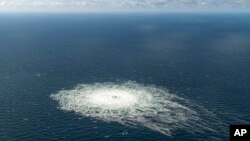ມະຕິສະບັບໜຶ່ງທີ່ສະເໜີໂດຍຣັດເຊຍ ໃນວັນຈັນວານນີ້ ຢູທີ່ອົງການສະຫະປະຊາຊາດ ຮຽກຮ້ອງໃຫ້ມີການສືບສວນສາກົນ ກ່ຽວກັບອັນທີ່ປາກົດວ່າເປັນການກໍ່ວິນາດສະກຳໃນປີກາຍນີ້ ຕໍ່ທໍ່ສົ່ງແກັສ Nord Stream ບໍ່ໄດ້ຮັບການສະໜັບສະໜຸນຈາກສະພາຄວາມໝັ້ນຄົງ ແລະເຮັດໃຫ້ມີການຊີ້ໜ້າກັນລະຫວ່າງທູດສະຫະລັດ ແລະຣັດເຊຍ.
ທ່ານ ວາສຊີລີ ເນເບນເຊຍ (Vassily Nebenzia) ເອກອັກຄະລັດຖະທູດຣັດເຊຍກ່າວວ່າ "ຂ້າພະເຈົ້າຄິດວ່າຫຼັງຈາກການລົງຄະແນນສຽງໃນມື້ນີ້, ຄວາມສົງໄສວ່າໃຜເປັນຜູ້ຢູ່ເບື້ອງຫຼັງຂອງການກໍ່ວິນາດສະກຳ ຕໍ່ Nord Stream ແມ່ນຈະແຈ້ງ,".
ຮ່າງມະຕິຂອງຣັດເຊຍໄດ້ຮັບການເຫັນດີພຽງ 3 ສຽງເທົ່ານັ້ນ ຄື ຈາກຕົນເອງ, ຈີນ ແລະ ບຣາຊິລ. ສະມາຊິກສະພາຄວາມໝັ້ນຄົງອີກ 12 ທ່ານໄດ້ງົດອອກ ສຽງ. ເພື່ອຮັບຮອງເອົາຮ່າງມະຕິດັ່ງກ່າວ, ມັນຕ້ອງການຄະແນນສຽງເຫັນດີ ຢ່າງໜ້ອຍ 9 ສຽງ ແລະຕ້ອງບໍ່ມີການຄັດຄ້ານຈາກສະມາຊິກຖາວອນ.
ທ່ານ ເນເບນເຊຍ ອ້າງໂດຍບໍ່ມີຫຼັກຖານວ່າ "ຂ້າພະເຈົ້າຕ້ອງການເຕືອນທ່ານກ່ຽວກັບຄວາມຈິງພື້ນຖານບາງຢ່າງ, ໃນສາຍຕາຂອງຄົນທົ່ວໂລກ, ສະຫະລັດ ແລະພັນທະມິດ ໄດ້ເຮັດທຸກຢ່າງທີ່ພວກເຂົາສາມາດເຮັດໄດ້ ເພື່ອຮັບປະກັນວ່າບໍ່ມີການສືບສວນສາກົນ ກ່ຽວກັບສິ່ງທີ່ເກີດຂຶ້ນຕໍ່ Nord Stream ໃນເດືອນກັນຍາ,"
ທູດພິເສດສະຫະລັດໄດ້ຕອບໂຕ້ຄືນ ໂດຍກ່າວວ່າ ມົສກູກຳລັງຊອກຫາທາງທີ່ຈະທຳລາຍຊື່ສຽງຂອງການສືບສວນພາຍໃນປະເທດທີ່ຍັງດຳເນີນຢູ່ ກ່ຽວກັບເຫດລະເບີດດັ່ງກ່າວ ແລະເຮັດໃຫ້ຂໍ້ສະຫຼຸບຂອງພວກເຂົາເສຍຫາຍ.
A resolution put forward Monday by Russia at the United Nations calling for an international investigation into the apparent sabotage last year on the Nord Stream gas pipelines has failed to win Security Council support and led to more finger pointing between the U.S. and Russian envoys.
“I think that after today’s vote, suspicion as to who is behind the act of sabotage on the Nord Stream is just obvious,” Russian Ambassador Vassily Nebenzia said.
Russia’s draft resolution received only three votes in favor — from itself, China and Brazil. The other 12 Security Council members abstained. A draft resolution needs at least nine votes in favor and no vetoes by permanent members to be adopted.
“I’d like to remind you of some basic facts, in the eyes of the whole world, the U.S. and its allies have done everything it can to ensure that there is no international investigation of what happened to Nord Stream in September,” Nebenzia claimed without evidence.
The U.S. envoy hit back, saying Moscow is seeking to discredit ongoing domestic investigations into the explosion and prejudice their conclusions.
“Since the attacks took place, Russia has blamed the United States for carrying out these attacks,” U.S. envoy Robert Wood told council members. “With those comments, it was very clear that Russia was not interested in an impartial investigation. It had already decided who the guilty culprit was. Russia was simply playing politics.”
Russia has repeatedly seized on public comments that U.S. President Joe Biden made just weeks before the Kremlin launched its full-scale invasion of Ukraine in February last year, saying that if an invasion went ahead, “there will be no longer a Nord Stream 2. We will bring an end to it.”
Between September 26 and 29, 2022, explosions caused four leaks in the Nord Stream 1 and 2 pipelines, which run along the floor of the Baltic Sea, and which Russia uses to supply Europe with gas.
The damage occurred off the shores of Sweden and Denmark, who said at least two underwater detonations occurred on September 26 damaging pipelines on Nord Stream 1 and 2, causing “major leaks” of natural gas with a radius several hundred meters wide.
Danish, Swedish and Germany authorities are conducting ongoing investigations into the attacks. Preliminary reports found that “powerful explosions” and “gross sabotage” caused the damage.
In its proposed resolution, Russia wanted U.N. Secretary-General Antonio Guterres to establish an international independent investigation commission to probe all aspects of the attacks, including identifying the “perpetrators, sponsors, organizers and accomplices.”
Several council members said an additional investigation would not be beneficial right now and urged waiting for the results of the national ones. Others suggested that a deadline be imposed for the national investigations to conclude, saying they should not be open-ended.
Several Western countries noted Russia’s interest in the safety of critical infrastructure.
“Russia’s apparent concern for civilian infrastructure is hard to take seriously in the context of its relentless assault on Ukraine’s civilian infrastructure over the last year,” U.K. deputy ambassador James Kariuki said. “This cynical aggression must stop.”




